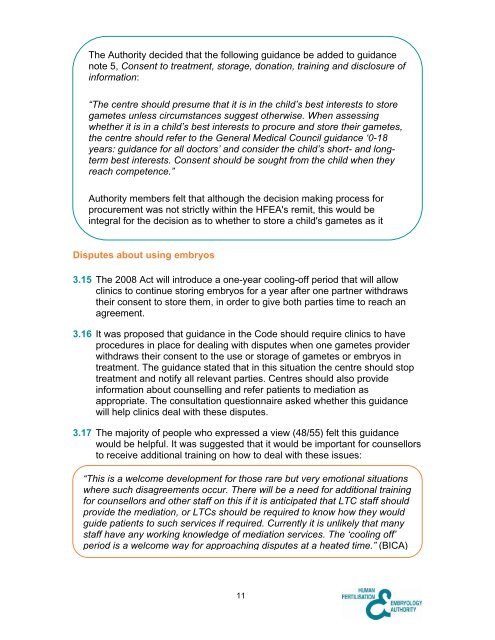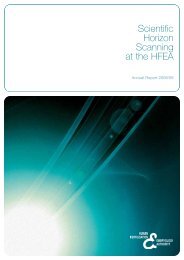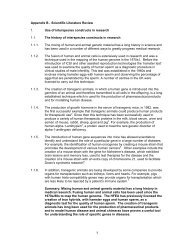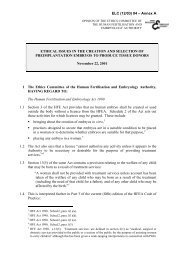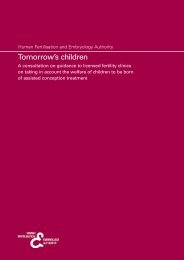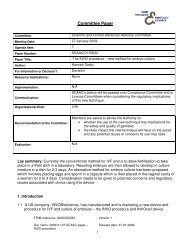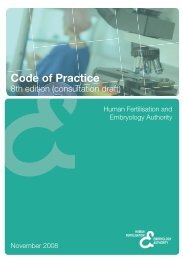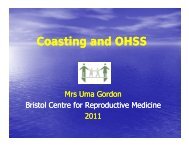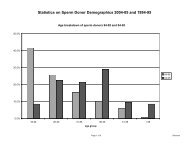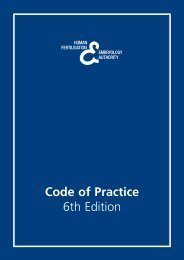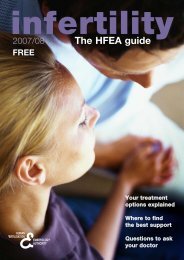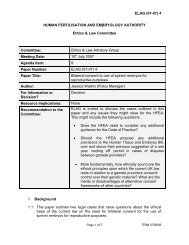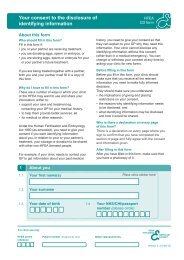Code of Practice 8th edition and consent forms consultation report
Code of Practice 8th edition and consent forms consultation report
Code of Practice 8th edition and consent forms consultation report
Create successful ePaper yourself
Turn your PDF publications into a flip-book with our unique Google optimized e-Paper software.
The Authority decided that the following guidance be added to guidance<br />
note 5, Consent to treatment, storage, donation, training <strong>and</strong> disclosure <strong>of</strong><br />
information:<br />
“The centre should presume that it is in the child’s best interests to store<br />
gametes unless circumstances suggest otherwise. When assessing<br />
whether it is in a child’s best interests to procure <strong>and</strong> store their gametes,<br />
the centre should refer to the General Medical Council guidance ‘0-18<br />
years: guidance for all doctors’ <strong>and</strong> consider the child’s short- <strong>and</strong> longterm<br />
best interests. Consent should be sought from the child when they<br />
reach competence.”<br />
Authority members felt that although the decision making process for<br />
procurement was not strictly within the HFEA's remit, this would be<br />
integral for the decision as to whether to store a child's gametes as it<br />
Disputes about using embryos<br />
3.15 The 2008 Act will introduce a one-year cooling-<strong>of</strong>f period that will allow<br />
clinics to continue storing embryos for a year after one partner withdraws<br />
their <strong>consent</strong> to store them, in order to give both parties time to reach an<br />
agreement.<br />
3.16 It was proposed that guidance in the <strong>Code</strong> should require clinics to have<br />
procedures in place for dealing with disputes when one gametes provider<br />
withdraws their <strong>consent</strong> to the use or storage <strong>of</strong> gametes or embryos in<br />
treatment. The guidance stated that in this situation the centre should stop<br />
treatment <strong>and</strong> notify all relevant parties. Centres should also provide<br />
information about counselling <strong>and</strong> refer patients to mediation as<br />
appropriate. The <strong>consultation</strong> questionnaire asked whether this guidance<br />
will help clinics deal with these disputes.<br />
3.17 The majority <strong>of</strong> people who expressed a view (48/55) felt this guidance<br />
would be helpful. It was suggested that it would be important for counsellors<br />
to receive additional training on how to deal with these issues:<br />
“This is a welcome development for those rare but very emotional situations<br />
where such disagreements occur. There will be a need for additional training<br />
for counsellors <strong>and</strong> other staff on this if it is anticipated that LTC staff should<br />
provide the mediation, or LTCs should be required to know how they would<br />
guide patients to such services if required. Currently it is unlikely that many<br />
staff have any working knowledge <strong>of</strong> mediation services. The ‘cooling <strong>of</strong>f’<br />
period is a welcome way for approaching disputes at a heated time.” (BICA)<br />
11


